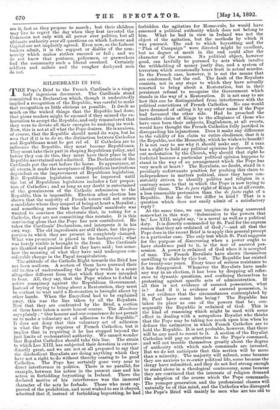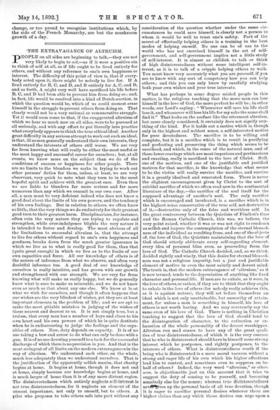HILDEBRAND IN 1892. T HE Pope's Brief to the French Cardinals
is a singu- larly ingenious document. The Cardinals stand committed to a Declaration which, though it undoubtedly implied a recognition of the Republic, was careful to make that recognition as little obvious as possible. It dwelt so much on the wicked things that the Republic had done, that pious readers might be excused if they missed the ex- hortation to accept the Republic, and only remembered that they were to devote all their energies to undoing its work. Now, this is not at all what the Pope desires. He is anxious, of course, that the Republic should mend its ways, but he sees that if it is to do so, the distinction between Catholics and Republicans must be got rid of. If Catholics are to influence the Republic, they must become Republicans. They must take their part in shaping Republican policy, and before they can do this, they must have their place in the Republic ascertained and admitted. The Declaration of the Cardinals put the cart before the horse. In appearance, at all events, it made the acceptance of Republican institutions dependent on the improvement of Republican legislation. But Republican legislation cannot be improved until the list of Republican legislators includes a fair propor- tion of Catholics ; and as long as any doubt is entertained of the genuineness of the Catholic submission to the Republic, this is impossible. Election after election has shown that the majority of French voters will not return a candidate whom they suspect of being at heart a Royalist ; and something more than the Cardinals' manifesto was wanted to convince the electorate that, in voting for a Catholic, they are not committing this mistake. It is this convincing gloss that the Pope has now contributed. He takes the Cardinals' Declaration, and interprets it in his own way. The old ingredients are still there, but the pro- portion in which they are present is completely changed. What was prominent is placed in the background ; what was barely visible is brought to the front. The Cardinals are thanked and praised for all they have said ; but some- how the meaning of what they have said undergoes con- siderable change in the Papal recapitulation.
The attitude of the Catholic Right towards the Brief has not been uniform. A section of them have pursued their old tactics of understanding the Pope's words in a sense altogether different from that which they were intended to bear. All, they say, that the Pope wishes to forbid is active conspiracy against the Republican Government. Instead of trying to bring about a Restoration, they must be content to wait until a Restoration is brought about by other hands. When the Encyclical had to be explained away, this was the line taken by all the Royalists. Now that they are confronted by the Brief, a section of them have taken a more honest course. The Moniteur says plainly : "Our honour and our conscience do not permit us to make a voluntary act of adhesion to the Republic." It does not deny that this voluntary act of adhesion is what the Pope requires of French Catholics, but it implies that in requiring it he has stepped beyond the just limits of ecclesiastical authority. We cannot wonder that Royalist Catholics should take this line. The strain to which Leo XIII. has subjected their devotion is extraor- dinarily great, and we are not at all prepared to say that the disobedient Royalists are doing anything which they have not a right to do without thereby ceasing to be good Catholics. The Pope has certainly gone very near to direct interference in politics. There is no parallel, for example, between his action in the present case and his action in forbidding boycotting in Ireland. There the declared motive of his interference was the immoral character of the acts he forbade. Those who most ap- proved of the prohibition, and most wished to see it obeyed, admitted, that if, instead of forbidding boycotting, he had forbidden the agitation for Home-rule, he would have assumed a political authority which does not belong to him. What he had in view in Ireland was not the object of the agitation, but the methods by which it was pursued. The end to which boycotting and the "Plan of Campaign" were directed might be excellent, but no degree of merit in the end could alter the character of the means. No political object, however good, can lawfully be pursued by acts which involve the withholding of money justly due, and a system of terrorism which occasionally bears fruit in actual murder. In the French case, however, it is not the means that are condemned, but the end. The fault of the Royalists consists, not in any steps to which they have actually resorted to bring about a Restoration, but in their persistent refusal to recognise the Government which stands in the way of a Restoration. It is not easy to see how this can be distinguished from interference with the political convictions of French Catholics. No one would have dreamed of calling it by any other name if the Pope had favoured the other side. Had he preached the inalienable claim of Kings to the allegiance of those who have once been their subjects, Englishmen, at all events, would have thought the French Catholics fully justified in disregarding his injunctions. Does it make any difference to the validity of his claim to entire obedience, that it is the Republic, not the Monarchy, which he wishes to benefit? It is not easy to see why it should make any. If a man has a right to hold any political opinions he chooses, with- out molestation by the Church, why should that right be forfeited because a particular political opinion happens to stand in the way of an arrangement which the Pope has very much at heart ? The Royalists, no doubt, stand in a peculiarly unfortunate position for pushing this claim to independence in matters political, since they have con- sistently striven to identify politics and religion in a contrary sense to that in which the Pope is now trying to identify them. The de jure right of Kings is, at all events, a less reasonable pretension than the de facto right of a Republic. But do the two differ in kind ? That is a question which does not easily admit of a satisfactory reply ? At the same time, we can imagine its being answered somewhat in this way. Submission to the powers that be,' Leo XIII. might say, is a moral as well as a political duty. It is directly commanded by St. Paul for the express reason that they are ordained of God ;'—and all that the Pope does in the recent Brief is to apply this general precept to a particular case. The only test which St. Paul suggests for the purpose of discovering when a power ought to have obedience paid to it, is the test of assured pos- session. A power is ordained of God when it is accepted of man. The French Royalists have shown themselves unwilling to abide by this test. The Republic has existed for twenty-one years. Every trace of serious resistance to it has disappeared. Whenever the Royalists have made any way in an election, it has been by dropping all refer- ence to dynastic questions, and confining themselves to protesting against specific acts of administration. If all this is not evidence of assured possession, what is ? And if it is evidence of assured possession, is it not evidence that the circumstances contemplated by St. Paul have come into being ? The Republic has taken its place as one of the powers that be ; con- sequently the Republic is ordained of God. This is the kind of reasoning which might be Used with some effect in dealing with a scrupulous Royalist who thinks that the Pope may be taking too much upon him when he defines the estimation in which French Catholics are to hold the Republic. It is not probable, however, that there will be any need to resort to it. A section of the Royalist Catholics will pay no attention to the Pope's command, and will not trouble themselves greatly about the degree of authority with which such commands are invested. But we do not anticipate that this section will be more than a minority. The majority will submit, some because they are anxious to re-enter political life, some because the clergy have submitted, and they do not feel strong enough to stand alone in a theological controversy, some because they are convinced that the interests of religion demand the adoption of the course which the Pope commands. The younger generation and the professional classes will naturally be of this mind, and the Catholics who disregard the Pope's Brief will mainly be men who are too old to
change, or too proud to recognise institutions which, by the side of the French Monarchy, are but the mushroom growth of a day.







































 Previous page
Previous page